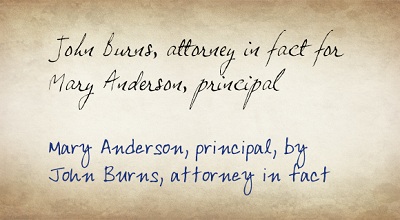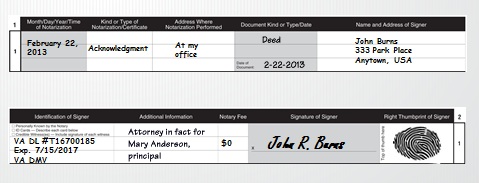Ohhhh how getting Powers of Attorney documents signed and notarized can be a PAIN for the party needing to get it done. Having your Power of Attorney paperwork completed before someone gets ill, hurt, or worse can be an amazing relief. Having Power of Attorney means that you have designated another person to sign documents on behalf of you. It is very common for someone elderly to appoint their son or daughter as Power of Attorney. This way if something happens to them their son or daughter (whomever is appointed POA) can signed for them. It always saddens me when Tallahassee Notary is called to nursing homes, Hospice, or hospitals and the family is HOPING their loved one can sign the documents. Depending on their state it sometimes can be very difficult.
Here are Four FAQs from Notaries about Powers of Attorney posted recently to the National Notary Association Notary Bulletin. If you are in need of a POA please read these facts and contact us Tallahassee Notary for additional hesitance!
Four FAQs From Notaries About Powers Of Attorney
What is a power of attorney document?
A power of attorney is a legal document authorizing someone to make decisions and sign documents on behalf of someone else. Generally, the person creating the power of attorney is known as the “principal,” who authorizes another person to act as an “agent,” or “attorney in fact” to sign documents as the principal’s representative.
If someone signs a document as attorney in fact, whose name and signature am I notarizing, the attorney in fact, the principal or both?
You notarize the signature of the attorney in fact, not the principal. The confusion may spring from the fact that when signing a document on behalf of a principal, an attorney in fact will typically sign their name and the name of the person they are representing, such as “John Burns, attorney in fact for Mary Anderson, principal” or “Mary Anderson, principal, by John Burns, attorney in fact.”

However, since the attorney in fact has legal authority to represent the principal, you notarize the attorney in fact’s signature. This means you verify the identity of the attorney in fact — not the principal — following your state’s laws and write only the attorney in fact’s name in the notarial certificate wording.
When signing your journal entry, the attorney in fact should sign only his or her name. Under the “Additional information” section of the journal entry, you should note that the attorney in fact is signing on behalf of an absent principal and include the principal’s name.

An attorney in fact presented me with an affidavit that includes the principal’s name and is requesting a jurat. Can an attorney in fact swear to or affirm the statement in the affidavit on behalf of the principal?
In most cases, one person cannot swear to or affirm truthfulness on behalf of another. If the attorney in fact requests a jurat or verification upon oath or affirmation, the attorney in fact must swear to or affirm the statement in his or her name only.
Using our previous example, if John Burns, attorney in fact for principal Mary Anderson, requests that you execute a jurat, he may state “I, John Burns, swear (or affirm) …” but he may not state “Mary Anderson swears (or affirms) ….”
If I’m notarizing the signature of an attorney in fact, do I need to ask for proof the signer has power of attorney first?
Each state’s laws are different on this matter, so you will need to check your state’s Notary handbook or guidelines. Some states, such as Hawaii and Utah, require the Notary to see proof that the signer has power of attorney. Most other states do not.